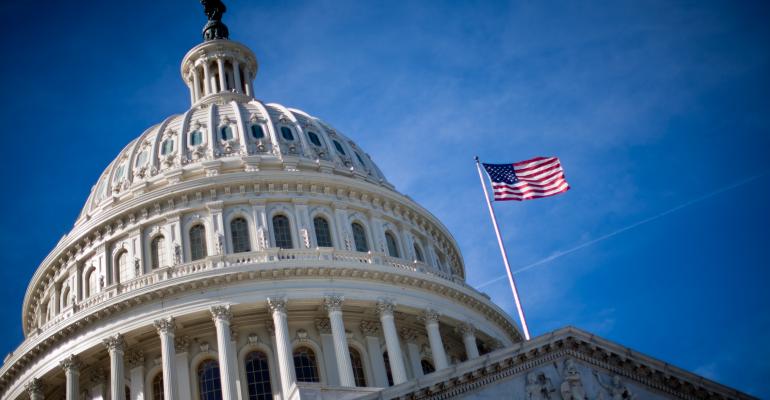(The opinions expressed here are those of the author, a columnist for Reuters.)
CHICAGO, Feb 16 (Reuters) - So much for states' rights.
The Republican-controlled Congress took aim this week at states that are creating retirement saving programs for workers who do not already have 401(k)s through their jobs. Seven states - including populous California, Illinois and Maryland - are implementing government-sponsored auto-IRA plans, and another 30 are considering their own, according to AARP, which has been supporting and tracking the initiatives.
Saving for retirement should not be all that controversial, but state plan opponents in the business community object to an expansive government role and the mandatory features of some of the state plans.
The House of Representatives approved a resolution on Wednesday that would invalidate an important rule handed down last year by the U.S. Department of Labor (DoL) in support of the state plans. The measure now goes to the Senate. The rule exempts state plans from the Employee Retirement Income Security Act of 1974 (ERISA) if they meet certain conditions. That provides important reassurance to employers participating in the plan, who worry about compliance cost and legal liability under ERISA.
The House resolution is an especially aggressive reach into the business of states - and one rich in irony, considering Republicans' frequent worship at the altar of states' rights. But the auto-IRA programs have powerful opponents in the financial services industry who do not want to see a lower-cost government-sponsored "public option" to the retirement products they sell.
"This is a payoff to the financial services industry," said Joshua Gotbaum, a guest scholar at the Brookings Institution who is serving as chairman of the Maryland auto-IRA program.
"They are afraid of competition that would come from a huge program like this that forces them to cut their own fees," said Gotbaum, who is a former director of the Pension Benefit Guaranty Corporation, the federally sponsored agency that insures private sector pensions.
The resolution adds the auto-IRA to an anti-consumer hit list that already includes the DoL fiduciary rule governing advice to retirement savers. (http://reut.rs/2lP6l1v).
Repeal would not stop the states that have already enacted programs, Gotbaum said. But it will create uncertainty. "It might mean that states will need to get opinions from lawyers or the courts on whether the plans are subject to ERISA or not." And repeal could well slow down the momentum among states still considering the idea.
The state initiatives started after the Obama administration's proposal for a national auto-IRA program was shot down by the Republican Congress.
And support for the idea across the country has been strong. Just last week, a telephone poll of 800 Americans by the National Institute on Retirement Security found a 75 percent public approval rating for state plans.
LESS GOVERNMENT?
Opponents' objections - summarized in a letter to lawmakers this week from a business coalition led by the U.S. Chamber of Commerce - include opposition to the mandatory participation feature of some state plans, although the mandate is to simply require employers to enable payroll deductions (but not contributions) for uncovered workers. They also worry about the administrative burden of managing plans with differing standards in multiple states.
The Chamber letter also argues that states cannot be trusted to run these programs in light of underfunding of public-worker pension funds in some states. That argument does not hold water, since pooled pension plans funded by taxes and worker contributions bear no resemblance whatever to the auto-IRA plans, which envision individual accounts held by a third party custodian.
So this really is an ideological attack on the idea that government should take steps to help people save more money. "Our nation faces difficult retirement challenges, but more government isn't the solution," said U.S. Representative Tim Walberg, a Michigan Republican who co-sponsored the House resolution.
Never mind that the private sector has failed to deliver on coverage: 401(k)s have existed since the 1980s, yet only half of U.S. private-sector workers participate in a retirement plan at any given time, according to the Center for Retirement Research at Boston College.
Republicans are coalescing around a different approach to expanded retirement plan coverage. The Retirement Enhancement and Savings Act (RESA), approved by the Senate Finance Committee last year, aims to expand saving through enhanced tax credits for small employers who start workplace plans. The bill also would make it easier for businesses to create shared retirement plans - sometimes called Multiple-Employer Plans (MEPs) - as a way to cut costs and administrative burden.
MEPs have enjoyed bipartisan support, but they would be voluntary. Few experts think they would have as much impact on coverage levels as the mandatory state IRA plans. "There is a lot of skepticism that if these plans don't have a required participation feature of some sort, it won't be enough to shift the tide," said Shai Akabas, director of fiscal policy at the Bipartisan Policy Center. "There needs to be more of a gentle nudge in that direction."
AARP, which has been a major lobbying force in favor of state plans, agrees that these plans may not be the perfect solution - and it does not object to the Republican MEP initiative. But it holds that some action is better than none.
"We do have a preference for things like auto-enrollment and payroll deduction, because behavioral economics tell us that these things work," said Cristina Martin Firvida, AARP's director of financial security. "But letting the perfect be the enemy of the good doesn't expand coverage for anyone. We don't want to keep waiting for the perfect solution to come along."
(Editing by Matthew Lewis)






